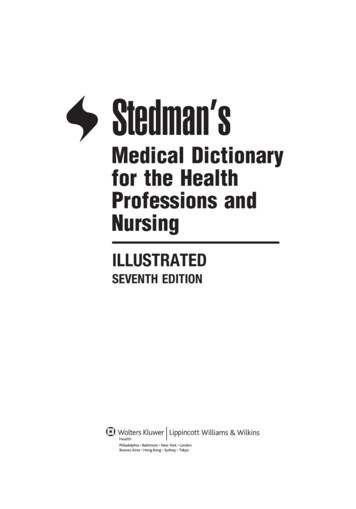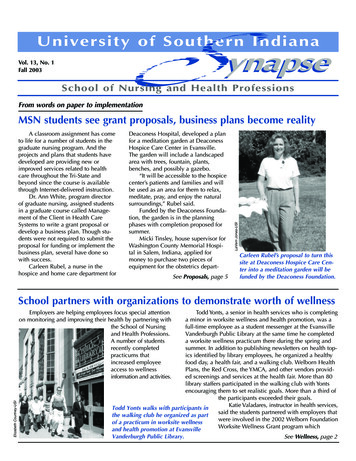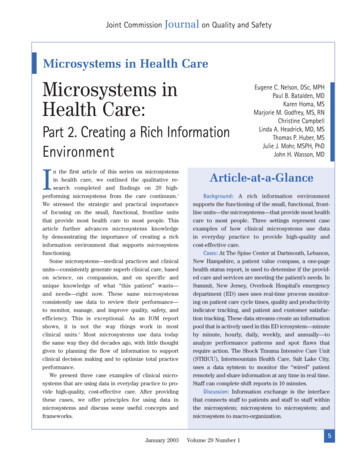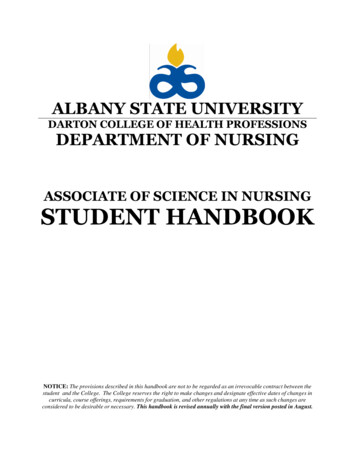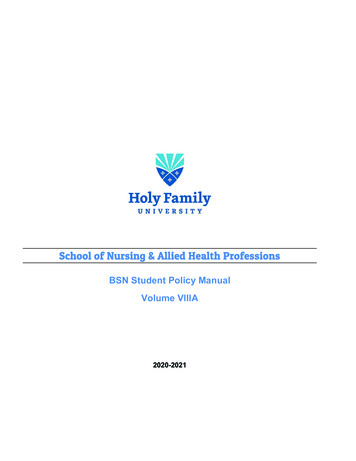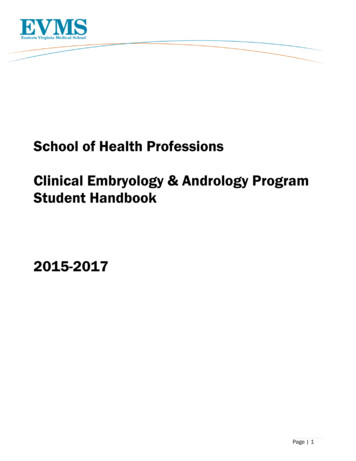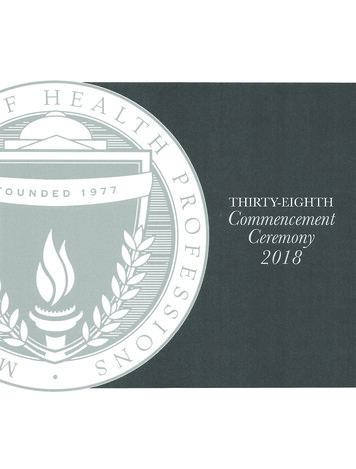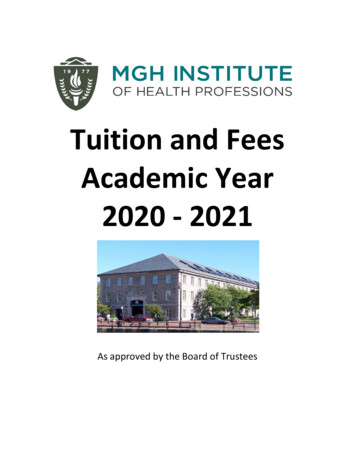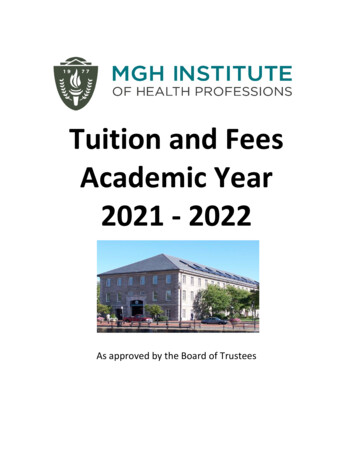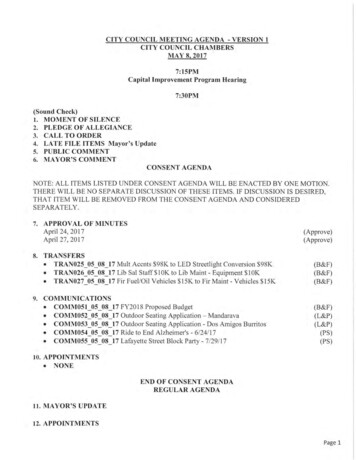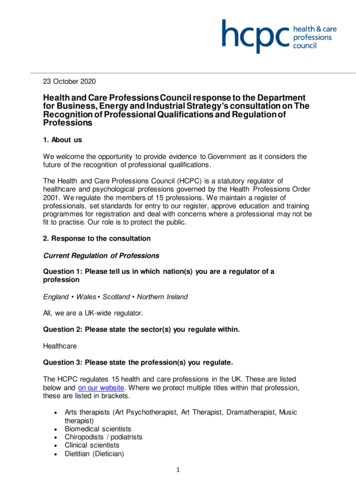
Transcription
23 October 2020Health and Care Professions Council response to the Departmentfor Business, Energy and Industrial Strategy’s consultation on TheRecognition of Professional Qualifications and Regulation ofProfessions1. About usWe welcome the opportunity to provide evidence to Government as it considers thefuture of the recognition of professional qualifications.The Health and Care Professions Council (HCPC) is a statutory regulator ofhealthcare and psychological professions governed by the Health Professions Order2001. We regulate the members of 15 professions. We maintain a register ofprofessionals, set standards for entry to our register, approve education and trainingprogrammes for registration and deal with concerns where a professional may not befit to practise. Our role is to protect the public.2. Response to the consultationCurrent Regulation of ProfessionsQuestion 1: Please tell us in which nation(s) you are a regulator of aprofessionEngland Wales Scotland Northern IrelandAll, we are a UK-wide regulator.Question 2: Please state the sector(s) you regulate within.HealthcareQuestion 3: Please state the profession(s) you regulate.The HCPC regulates 15 health and care professions in the UK. These are listedbelow and on our website. Where we protect multiple titles within that profession,these are listed in brackets. Arts therapists (Art Psychotherapist, Art Therapist, Dramatherapist, Musictherapist)Biomedical scientistsChiropodists / podiatristsClinical scientistsDietitian (Dietician)1
Hearing aid dispensersOccupational therapistsOperating department practitionersOrthoptistsParamedicsPhysiotherapists (Physical therapist)Practitioner psychologists (Practitioner psychologist, Registered psychologist,Clinical psychologist, Forensic psychologist, Counselling psychologist, Healthpsychologist, Educational psychologist, Occupational psychologist, Sport andexercise psychologist)Prosthetists / orthotistsRadiographers (Radiographer, Diagnostic Radiographer, TherapeuticRadiographer)Speech and language therapists (Speech Therapist)Question 4: Please outline the rationale for regulation within your sector.Listed below are some non-exhaustive possible rationales for regulation you may liketo consider in your answer. In each instance, please explain their importance toregulation within your sector Protects public interest for environmental reasons Protects public safety for healthreasons Value for money / protects taxpayer Enables professionals to chargemore for their services Protects consumers from receiving a low quality of services Provides trainingProtects public safety for health reasonsThe HCPC’s purpose is to protect the public. That is the key reason we exist andunderpins all our regulatory functions. The HCPC is governed by the HealthProfessions Order 2001. Article 3(4) of the Order states that the over-archingobjective of the Council is ‘the protection of the public’. Article (4A) states that thisinvolves the pursuit of the following objectives:a) To protect, promote and maintain the health, safety and well-being of thepublic;b) To promote and maintain public confidence in the professions regulated;c) To promote and maintain proper professional standards and conduct formembers of those professions.We note the most relevant option available is ‘protects public safety for healthreasons’. We would however like to emphasise that we consider our publicprotection purpose to be wider than just health. For example, our regulatory remitwould extend to harm committed outside the health sector, for example in aregistrant’s personal life, if it were likely to impact on the public’s confidence in thathealth professional and the wider sector.We also believe we have a key role to play in ‘upstreaming’ regulation, looking atissues as they arise in practice and trying to prevent harm from occurring before itescalates to a fitness to practise (FTP) concern. To that end, we work with key
stakeholders including employers, education providers and professional bodies toidentify problems in practice. We also commission independent research on topicslike professionalism and how we can prevent harm occurring. This then leads us todevelop guidance, online resources and webinars for our registrants to help themdevelop their practice. All this work plays a vital role in protecting public safety.We also play a key role in influencing the content of the education and training of ourhealthcare professionals. We approve education and training programmes in the UKand set standards for education providers to meet. We also issue professionalstandards, known as the standards of proficiency, which education providers have toensure their students can meet at the point they join the Register. This is againunderpinned by a need to protect the public, and these professional standards areset at the threshold for ‘safe and effective practice’. We have not selected the option‘provides training’ as we do not feel this sufficiently captures that role. However, wewanted this key function noted in our response.In regards to value for money / protects taxpayer, we are entirely funded by ourregistrant’s fees. We therefore do not receive money from the taxpayer moregenerally. As we are funded by our registrant’s fees, it is very important that weoperate in a cost effective way. This is particularly so as we regulate 15 differentprofessions, and so all our regulatory processes are streamlined to suit all of ourprofessions. We continue to strive to be an effective multi-professional regulator.Question 5: Please outline any evidence you have on the consumer protectionimpacts provided by your regulations.We are unclear what is meant by ‘consumer protection impacts’. As above, thereason we regulate the professions that we do is to protect the public. Therefore weare not concerned with consumer protection in the traditional sense and we do notmake decisions about our regulatory functions with consumer protection in mind.Importantly, our fitness to practise function is unable to take action against consumeror customer service issues. Our focus is on a registrant’s fitness to practise, andtherefore we can only look into concerns about this.However, through our fitness to practise process, we will consider concerns wherean individual’s experience placed the profession in a negative light, to the extent thatit undermines the public’s trust and confidence in the profession. This is because itcould impact on public protection, by making that individual less confident in theprofession and less likely to seek medical advice from them in the future. In thelonger term, this could result in disengagement with the health sector and greaterpublic harm through negative health outcomes.International RecognitionThe following questions focus on the route to recognition you offer for applicants withinternational qualifications.Question 6: Please outline your process(es) of recognising someone with aninternational qualification. In your answer, please include details of how this
differs from the process of recognising a domestic applicant, the rationale forthis/ the reasons why this is the case, and the costs of administering thisroute.If you have different processes for different international routes (e.g. forcandidates from the EU, USA, Australia, or due to any Mutual RecognitionAgreements you hold), please include details on the differences between them.The Health and Care Professions Council currently has the following applicationroutes in place:InternationalTo be eligible to apply for registration via the international route, applicants musthave qualified in one of the relevant professions outside of the United Kingdom andEuropean Union. International applicants are required to complete an Internationalapplication form, which can be download from the HCPC website, and sent via post.As part of their application applicants must include a course information form. Thecourse information form provides HCPC with details of theoretical and practicalcontent of the courses that have successfully undertaken by the applicant.Applicants also are required to declare their proficiency in English. Applicants whosefirst language is not English and who are required to provide a language testcertificate as evidence of their proficiency must ensure that it is, or is comparable to,IELTS level 7.0 with no element below 6.5 (or IELTS level 8.0 with no element below7.5 for Speech and language therapists). Applicants must supply documents toconfirm their identity and address.Applications are scrutinised and checked for completeness including the verificationof qualifications, employment and translated documents. HCPC will contact theapplicant’s education provider, any relevant regulatory or professional bodies andany professional referees to verify the information that has been provided.Applications are then assessed against the Standards of Proficiency, which set outthe threshold standards we consider necessary to protect the public (unique to eac hof our registered professions). Applicants are encouraged to read and understandthe Standards of Proficiency for their chosen profession as their application will beassessed these.Applications are assessed by two assessors from the part of the register to whichthey are applying to. The assessors compare education and training with thestandards of proficiency. If shortfalls are identified the assessors will look to see ifthese Standards of Proficiency have been met through other relevant education,training or experience. At this point the assessor can recommend to:-Accept the application – The assessors will recommend that you meet thestandards of proficiency and are eligible for registration. Applicants will thenneed to pay the registration fee to become registered.-Request further information from the applicant - If a decision cannot bereached based on the information in the application.
-Reject – If, after assessment, the applicant is not able to meet the standardsof proficiency, HCPC will refuse admission to the Register. Applicants areable to appeal against this decision.-Test of Competence - If after reviewing an application and any furtherinformation submitted there are still standards outstanding, depending on thenumber of standards, the applicant may be invited to undertake a test ofcompetence. The test will normally be carried at the HCPCs offices in London.We charge a scrutiny fee of 495 to cover our costs in processing applications forregistration. This includes the costs involved in paying registration assessors, 81per assessor, to assess each application, training assessors, processing furtherinformation from applicants, appeals against recommendation given by ETC and theresources involved in processing applications. Applicants will then need to pay theregistration fee, 180, to become registered.European Mutual Recognition (EMR)To be eligible to apply via EMR route applicants must be fully qualified to practisetheir profession in one of the relevant European states. There is a presumption thatapplicants should be permitted to practise that profession in any other relevantEuropean state once qualified. However, if there are substantial differences betweenthe education, training and experience of the applicant and the requirements for thepractice of that profession in the UK, the applicant may be asked to compensate forthese differences.Applicants applying via the EMR route must meet the following conditions:- Be a citizen of a ‘relevant European state’ (an EEA Member State orSwitzerland), or an exempt individual who is treated as citizen (e.g. by virtueof marriage).- Be fully qualified to practise a relevant profession in a relevant European state(other than the UK) and, if the profession is not regulated in that state, to havepractised there for at least one out of the last ten years.- Have qualified in a relevant European state or hold qualifications obtainedoutside of the EEA or Switzerland which have been recognised in a relevantEuropean stateA Relevant European State is a Member State of the European Union, the EuropeanEconomic Area (EEA) State, or Switzerland.The mutual recognition of professional qualifications is governed by the Directive2005/36/EC. In the context of the professions HCPC regulate, this promotes freemovement within the EU and aids the process of establishment. Applicants need toquote this directive when applying, appealing or submitting information.Applicants are required to complete an EMR application form, which can bedownload from the HCPC website, and sent via post.As part of their application applicants must include a course information form. Thecourse information form provides HCPC with details of theoretical and practicalcontent of the courses that have been successfully undertaken by the applicant.
Applications are scrutinised and checked for completeness including the verificationof qualifications, employment, translated documents and rights to practice. HCPCwill contact the applicant’s education provider, any relevant regulatory orprofessional bodies and any professional referees to verify the information that hasbeen provided. HCPC use the Internal Market Information System (IMI) as an onlinetool to facilitate and communicate with public authorities in the EU.Applications are then assessed against the Standards of Proficiency, which set outthe threshold standards we consider necessary to protect the public (unique to eachof our registered professions). Applicants are encouraged to read and understandthe Standards of Proficiency for their chosen profession as their application will beassessed these.Applications are assessed by two assessors from the part of the register to whichthey are applying to. The assessors compare education and training with thestandards of proficiency. If shortfalls are identified the assessors will look to see ifthese Standards of Proficiency have been met through other relevant education,training or experience. At this point the assessor can recommend to:-Accept the application – The assessors will recommend that you meet thestandards of proficiency and are eligible for registration. Applicants will thenneed to pay the registration fee, 180, to become registered.-Request further information from the applicant - If a decision cannot bereached based on the information in the application.-Compensation measures (adaptation period/ aptitude test) - If the assessmentprocess identifies substantial differences between the applicants education,training and experience and those required to meet the standards ofproficiency, HCPC will ask the applicant to undertake a compensationmeasure. This will be set as an adaptation period but with the option, if theapplicant chooses, of taking an aptitude test instead.An Aptitude test is a structured interview, or a practical examination, wherethe outstanding Standards of Proficiency are assessed by two assessors. Theareas that the test cover and how the test should be undertaken is included inthe applicant’s record of assessment.A period of adaptation is a period of supervised practise and / or academictraining which allows an applicant with mutual recognition rights under theProfessional Qualifications Directive (Directive 2005/36/EC) to reach thestandard required to be registered with HCPC. If this period is successfullycompleted, an applicant can then be registered and practise their professionin the United Kingdom.We charge a scrutiny fee of 495 to cover our costs in processing applications forregistration. This includes the costs involved in paying registration assessors, 81per assessor, to assess each application, training assessors, processing furtherinformation from applicants, appeals against recommendation given by ETC and theresources involved in processing applications. Applicants will then need to pay theregistration fee, 180, to become registered.
Comparable QualificationThis is an alternative approach to scrutinising international applications for admissionto the Register. HCPC maintains a list of comparable international qualifications,qualifications from the highest proportion of applications that have been received andassessed to be comparable to the Standards of Proficiency for the relevantprofession.The assessment of a qualification’s comparability is based primarily upon theoutcome of applications for admission to the HCPC register. The comparabilityprocess does not involve the detailed approval or monitoring of an educationalprogramme, but the HCPC does keep the comparability of qualifications underreview. At present, there are a total of 49 qualifications on the List. Thesequalifications cover two professions (physiotherapists and radiographers), and fourcountries (Australia, New Zealand, Ireland and Portugal).Applicants are required to complete an application form, which can be downloadfrom the HCPC website, and sent via post. Once received applications are identifiedas Comparable Qualification applications and scrutinised including the verification ofqualifications, employment and translated documents. HCPC will contact theapplicant’s education provider, any relevant regulatory or professional bodies andany professional referees to verify the information that has been provided.Applications are not assessed by two assessors from the part of the register to whichapplicants are applying to. The recommendation is that the standards of proficiencyare met and the applicant is eligible for registration. Applicants will then need to paythe registration fee, 180, to become registered, in addition to the security feeinternational registrants are charged.EPC (European Professional Card)To be eligible to apply via EPC route, physiotherapists must be fully qualified topractise their profession in one of the relevant European states.EPC is an electronic procedure which makes it easier for physiotherapists within arelevant European states to transfer their professional rights between countries.Using EPC for the purpose of establishment is a two-stage process. If an applicantwishes to use the EPC application route rather than making a paper application toHCPC, they would need to contact the competent authority in the country of theirprofessional establishment. Applicants must use the Europa website to start the EPCapplication process.Applications are received via the Internal Market Information System (IMI) this is anonline tool that facilitates the exchange of information between public authoritiesinvolved in the practical implementation of EU law. IMI helps authorities to fulfil theircross-border administrative cooperation obligations in multiple Single Market policyareas.Applications are scrutinised and checked for completeness including the verificationof qualifications, employment, translated documents and rights to practice. HCPCwill contact the applicant’s education provider, any relevant regulatory or
professional bodies and any professional referees to verify the information that hasbeen provided.Applications are assessed by one assessor from the physiotherapy part of theregister. The assessors compare education and training with the standards ofproficiency.There are several possible outcomes to the application assessment process:-Recognition of professional qualifications - recommendation to accept foradmission to the Register.Requirement to complete a compensation measure – the applicant may beasked to undertake an adaptation period in order to reach the standardrequired to be registered. As an alternative, applicants may request anAptitude Test in place of the adaptation period. Two opportunities will beprovided to take the test should the applicant decide to pursue this option.If the assessment decision is the recognition of professional qualifications, in order tobecome registered, other checks, such as character and verification checks, mustalso be completed successfull
for Business, Energy and Industrial Strategy’s consultation on The Recognition of Professional Qualifications and Regulation of Professions 1. About us We welcome the opportunity to provide evidence to Government as it considers the future of the rec
